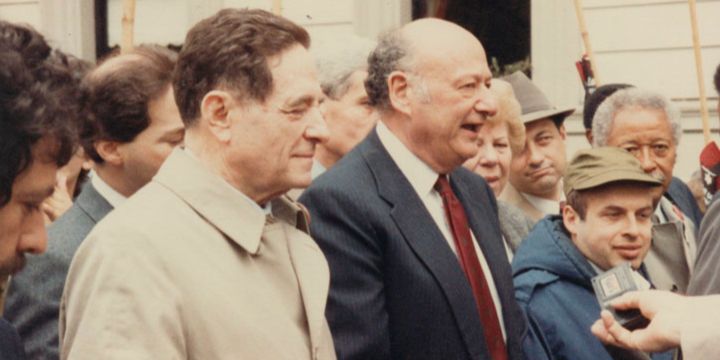Morris Abram (left), chairman of National Conference on Soviet Jewry, with Ed Koch, former Mayor of New York City, and Natan Sharansky, former Prisoner of Conscience. Photo: Center for Jewish History via Flickr.
The Russian-speaking Jewish community (RSJ) has traveled a long road to America.
From pogroms and World Wars to Soviet repression, our families fled in search of freedom and opportunity. New immigration to the US has slowed, and today, the future of the community rests with the children of those who arrived decades ago. What will their identity look like?
To find out, the American Russian-Speaking Jews Alliance (ARSJA) surveyed RSJ parents and received over 250 responses summarized in a new report.
The findings show a community deeply committed to raising Jewish children — even if traditional religious observance is not at the center.
Although 54 percent of the respondents do not keep kosher and only 3 percent attend synagogue daily, 89 percent of parents expect their children will have a “Very strong” or “Somewhat strong” Jewish identity.
Community life seems to be more popular than ritual. More than half of those surveyed attend RSJ gatherings or Israel-related events, and 67 percent go to synagogue on the High Holidays.
Shaul Kelner, professor of Jewish Studies and Sociology at Vanderbilt University, reminded us that, “American Jews are a diverse population, and there is no one-size-fits-all approach. It’s important that organizations like ARSJA are working to identify and respond to the specific needs of the Russian-speaking Jewish community.”
The “Russian-speaking” part of the identity is more complicated.
Most parents (58 percent) want their children to speak Russian mainly to communicate with grandparents.
Grandparents (75 percent) and parents (70 percent) are the people children use Russian with most often.
Yet only 60 percent of parents believe their children will maintain a strong RSJ identity. For some, the label recalls a painful past. One respondent said that they “see [their] Russian-speaking identity as really more of being raised in the former USSR, a totalitarian regime, the type of which we hope our children will never experience.”
Still, the community is finding new expressions of identity. Judi Garrett, COO at Jewish Relief Network Ukraine, points out that RSJs have played an active role in fundraising efforts. She noted that American-born RSJs organized campaigns that raised significant support for humanitarian aid in Ukraine. Philanthropy may become one of the ways that the next generation expresses who they are.
Parents also voiced deeper concerns. When asked what they worried about most regarding their children’s Jewish identity, the most common answers were antisemitism and assimilation. These anxieties echo across the wider American Jewish community and underscore how forces outside the family shape identity.
The survey does not provide simple answers. It does, however, spark an important conversation. For RSJs in America, the challenge is not only how to preserve their heritage, but how to pass down a Jewish identity rooted in belonging, pride, and purpose.
Mariella Favel leads data analysis at ARSJA, as well as research into how various communal and national organizations are influencing civic discourse.
Click this link for the original source of this article.
Author: Mariella Favel
This content is courtesy of, and owned and copyrighted by, https://www.algemeiner.com and its author. This content is made available by use of the public RSS feed offered by the host site and is used for educational purposes only. If you are the author or represent the host site and would like this content removed now and in the future, please contact USSANews.com using the email address in the Contact page found in the website menu.





